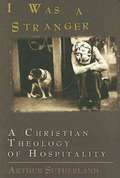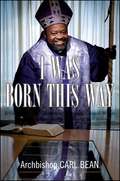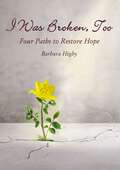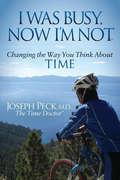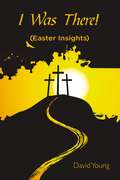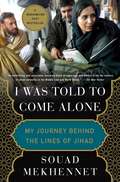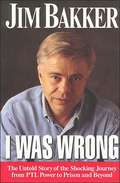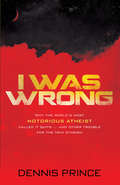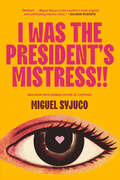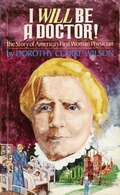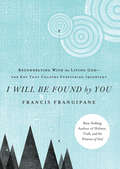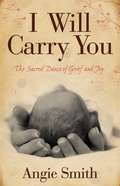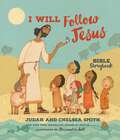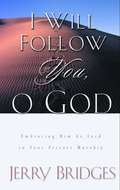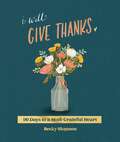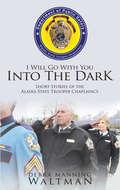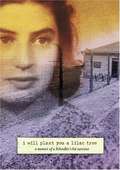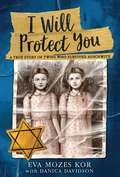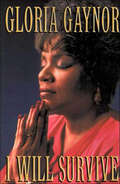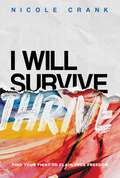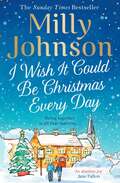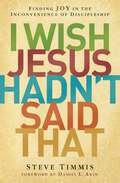- Table View
- List View
I Was A Stranger: A Christian Theology of Hospitality
by Arthur SutherlandArthur Sutherland places before us our fear of meeting the "other" and the "stranger" in an increasingly global, and frequently dangerous, village. Various social, political, and historical factors have conspired to leave us in a veritable crisis: the decline of hospitality.Why is this a crisis? Why should we practice hospitality? What is it about Christian theology that compels us to think about hospitality in the first place? Sutherland offers a passionate plea to recover and rediscover hospitality, and to respond to the divine appeal to welcome the stranger. Therein lies the central concern of the book: that hospitality is not simply the practice of a virtue but is integral to the very nature of Christianity’s position toward God, self, and the world—it is at the very center of what it means to be a Christian and to think theologically. He offers a challenging definition of hospitality and calls us to a practice that is the virtue by which the church stands or falls. Drawing on modern theologians (including Howard Thurman, Dietrich Bonhoeffer, Karl Barth, Martin Luther King Jr., and Letty Russell) and considering American slavery, the Holocaust, feminism, and prisons, Sutherland eloquently presents a Christian theology of hospitality.
I Was Born This Way
by David Ritz Carl BeanIn I Was Born This Way, Carl Bean, former Motown recording artist, noted AIDS activist, and founder of the Unity Fellowship of Christ Church in Los Angeles, shares his extraordinary personal journey from Baltimore foster homes to the stage of the Apollo Theater and beyond.CARL BEAN has been crossing boundaries all his life and helping others do the same. He's never been stopped by his race or orientation, never fit or stayed in the boxes people have wanted to put him in. He left his foster home in Baltimore at seventeen and took the bus to New York City, where he quickly found the rich culture of the Harlem churches. As a singer, first with the gospel Alex Bradford Singers and later as a Motown recording artist, Bean was a sensation. When Berry Gordy signed him to record "I Was Born This Way," it was a first: the biggest black-owned record company broadcasting a statement on gender identity. The #1 song, recorded with the Sweet Inspirations, was the first gay liberation dance club hit.Whether making records, educating the black community about HIV and AIDS, or preaching to his growing congregation, Archbishop Bean has never wanted to minister to just one group. He's worked on AIDS issues with C. Everett Koop and Elizabeth Taylor and on civil rights issues with Maxine Waters, Julian Bond, and Reverend Joseph Lowery. At the height of his recording career, he worked with Dionne Warwick, Burt Bacharach, Miles Davis, and Sammy Davis Jr. He's brought South Central Los Angeles gang members into his church, which now has 25,000 members in twelve cities nationwide; those same Crips and Bloods have shown up at the Gay Pride parades Bean has organized with U.S. Congresswoman Maxine Waters. And he has courageously devoted his time and energy to spurring black civil rights leaders to address the AIDS health crisis within the African American community--an issue on which they had been silent.Preaching an all-embracing progressive theology, he is an outspoken practitioner of brotherly love, a dynamic preacher, and a social activist. The Unity Fellowship message is grace: "God is love, and God is for everyone"; "God is gay, God is straight, God is black, God is white." I Was Born This Way is the rare personal history of one of black gospel's biggest stars and a frank, powerful, and warmhearted testament to how one man found his calling.
I Was Broken, Too: Four Paths to Restore Battered Hope
by Barbara HigbyHow do we hold on to hope when problems mount and feelings numb?Uninvited, invaders march into our lives--challenges, disappointments, loss. At times, these invaders creep in softly; often they blatantly barge in. Either way, the thieves break through our protective doors and wreak havoc. As we struggle to survive the onslaught, hope fades and we wonder if we will ever hope again.This is where author Barbara Higby found herself when her daughter suddenly died. Previous losses had tutored her in how to renew hope--a failed adoption process, the death of newborn twins, the challenges of a disabled son, the collapse of her calling--but her daughter&’s death plunged her to new a depth of hopelessness. Barbara&’s story of bringing life to her shattered hope will encourage others who are disheartened by loss.I Was Broken, Too offers four paths to restore hope in the battle-weary.H--Hold your Eyes HigherO--Open your Heart to God&’s OpportunitiesP--Ponder the Positive, not the ProblemsE--Expect GraceI Was Broken, Too was written for you, the broken, disillusioned, and wounded. If loss of any kind has assaulted your hope, follow the paths that revived Barbara&’s--they are achievable, and hope is possible. You will discover that what God has done for her, He will do for you.
I Was Busy Now I'm Not: Changing the Way You Think About Time (Morgan James Faith Ser.)
by Joseph PeckDo you know time is your life? When you waste your time, you waste your life.Does your time seem to be in short supply?Have you had enough of feeling overwhelmed?Are you ready to find time for what matters most? If so, this book will help you discover how to:* simplify your complicated life,* make time for what matters most, and* live your big dreams!
I Was There!: (Easter Insights)
by David YoungWhilst it is recognised that the death of Jesus has worldwide implications, this book is an attempt to put these events into a more personal context, hence the title &“I Was There&”.It is so easy to externalise the events leading up to and including the death and resurrection of Jesus but fail to internalise them by seeing ourselves as part of the story.These Easter Reflections are intended to help the reader see something of himself/herself through some of the characters present in the events of Palm Sunday leading up to Easter Day.
I Was Told to Come Alone: My Journey Behind The Lines Of Jihad
by Souad Mekhennet“I was told to come alone. I was not to carry any identification, and would have to leave my cell phone, audio recorder, watch, and purse at my hotel. . . .”For her whole life, Souad Mekhennet, a reporter for The Washington Post who was born and educated in Germany, has had to balance the two sides of her upbringing – Muslim and Western. She has also sought to provide a mediating voice between these cultures, which too often misunderstand each other.In this compelling and evocative memoir, we accompany Mekhennet as she journeys behind the lines of jihad, starting in the German neighborhoods where the 9/11 plotters were radicalized and the Iraqi neighborhoods where Sunnis and Shia turned against one another, and culminating on the Turkish/Syrian border region where ISIS is a daily presence. In her travels across the Middle East and North Africa, she documents her chilling run-ins with various intelligence services and shows why the Arab Spring never lived up to its promise. She then returns to Europe, first in London, where she uncovers the identity of the notorious ISIS executioner “Jihadi John,” and then in France, Belgium, and her native Germany, where terror has come to the heart of Western civilization.Mekhennet’s background has given her unique access to some of the world’s most wanted men, who generally refuse to speak to Western journalists. She is not afraid to face personal danger to reach out to individuals in the inner circles of Al Qaeda, the Taliban, ISIS, and their affiliates; when she is told to come alone to an interview, she never knows what awaits at her destination.Souad Mekhennet is an ideal guide to introduce us to the human beings behind the ominous headlines, as she shares her transformative journey with us. Hers is a story you will not soon forget.
I Was Wrong
by Jim BakkerAn air-conditioned doghouse. Tammy Faye crying on camera. Jessica Hahn. Jerry Falwell. The media circus gleefully trumpeted every detail of Jim and Tammy Faye's dizzying descent from the pinnacle of the multimillion-dollar Heritage USA Retreat Center and The Inspirational Network to ignominy, impoverishment--and in Jim's case - imprisonment. Yet the loss of his empire, his money, his home, and his reputation in the two years leading up to his imprisonment in 1989 was only the beginning. In prison, he was to lose even more-his freedom, his sanity, his dignity, his confidence in his faith, and eventually even his wife. Inmate 07407-058, one-time confidant to presidents, had hit bottom. In the humiliation, loneliness, and abject despair of prison, Bakker gradually began to realize that he had to dig deep and face things about himself that as a free man he had been too busy to face. What were those issues? How did he face them? How was he changed? Now for the very first time, Jim Bakker tells his own story--the glory days as a televangelist, the hostile takeover, the emotional breakdown. How he got to prison, his experiences behind bars, and what he learned. Jim Bakker was wrong about many things. Exactly what they were and how he came to confess them will surprise you and inspire you. This is his story.
I Was Wrong: Why the World's Most Notorious Atheist Called it Quits…and Other Trouble for the New Atheism
by Dennis PrinceThe seeds of this book were planted, ironically, because of a Global Atheist Convention in Melbourne, Australia. Troubled that such an event should be held in his city, Dennis Prince decided to publish a one-off newspaper, The Regal Standard, a dynamic collection of God-intervention stories alongside nuts-and-bolts answers to common questions, as a counter to the convention and to answer questions that would be raised. More than 80,000 copies of the paper were distributed, and its success inspired an expansion into this book. Graciously but decisively, each chapter presents the atheist or agnostic with well-documented God interventions in the lives of a kaleidoscope of people, each revealing God in a special and unique way. Christians, too, will be challenged and inspired, and better equipped to carry out their God-given mandate. Insights from the worlds of: · Atheists and former atheists · Scientists · Miracles · Sexual issues · Demonic forces · Gaming addiction · Heavenly visions and angels · Inspired songwriting · Hinduism and Islam And more
I Was the President's Mistress!!: A Novel
by Miguel Syjuco&“A super-typhoon of a novel. A Babel of rogues, survivors and shape-shifters. A polemic against corruption and greed. A sassy, swerving mini-series, touched by grace and beauty. A Filipino Bonfire of the Vanities for our beleaguered times. An uncompromising work of art.&” —David Mitchell, author of Utopia Avenue From the author of the Man Asian Award-winning Ilustrado, an unflinching satire about power, corruption, sex, and all the other topics you were told never to discuss in polite company. First came the Sexy-Sexygate scandal. Then an impeachment trial. Finally, a battle royale for the presidency. At the center of this political typhoon is Vita Nova, the Philippines&’ most famous movie star and former paramour of the country&’s most powerful man. Now, for the first time ever, she bares herself completely in a tell-all memoir that puts the sensational in sensationalistic.The setting: a sweating, heaving country. The time: right now. The plot: a drug war rages; an assassin brandishes a pistol; a damsel rises from ashes to power; and a government teeters on the brink. Among the players are a dreamer who boxed and acted his way to the presidency; his Koran-toting nemesis in the Senate; a horny bishop; a cowboy turned warlord; a poor little rich boy dying with his dynasty; a washed-up reporter redeemed by one last scoop; a high school sweetheart driven mad by decades of disappointment; and an American naval officer tempting our heroine with a way out. As Vita warns, viewer discretion is advised. In this masterful and audacious novel, Miguel Syjuco&’s signature style—hilarious, insightful, playful, and provocative—animates thirteen indelible voices whose stories present a cross-section of a complicated society. I Was the President&’s Mistress!! hurtles headlong into love, politics, faith, history, memory, and the ongoing war over who will tell the stories the world shall know as truth.
I Will Be A Doctor!
by Dorothy C. Wilson"I Will Be A Doctor" is a biography of Elizabeth Blackwell, the first woman physician in The United States. While the story may be classified as juvenile literature, I found it a pleasure to read and very enjoyable. The biography traces Elizabneth Blackwell's life from her childhood in England, to her migration to The United States, and much later back to England. Her life as a pioneer in her chosen vocation is fastinating. Because she lived primarily in the 19th century, there are many social issues which are discussed--slavery, women's rights, extreme poverty, infant death, and the huge issue of hygeine. Enjhoy!
I Will Be Found By You: Reconnecting With the Living God—the Key that Unlocks Everything Important
by Francis FrangipaneTo seek and find God is everything. In his forty-three years of seeking after God, Francis Frangipane has learned one simple (yet essential) truth… It is in seeking God, that we actually find Him. The deliberate movement of our hearts toward God leads us into far more than a simple answer to our need--it leads us straight to Him. We discover God to be an ally whose wisdom is all encompassing and whose power can transform all things with just one look. In I Will Be Found by You he shares a collection of some of his best writings on the topic, both old and new, to reveal the key to seeking God and possessing a heart after God--the key that unlocks everything important.
I Will Carry You: The Sacred Dance of Grief and Joy
by Angie SmithIn 2008, Angie Smith and her husband Todd (lead singer of the group Selah) learned through ultrasound that their fourth daughter had conditions making her "incompatible with life." Advised to terminate the pregnancy, the Smiths chose instead to carry this child and allow room for a miracle. That miracle came the day they met Audrey Caroline and got the chance to love her for the precious two-and-a-half hours she lived on earth. Upon receiving the original diagnosis, Angie started a blog (Bring the Rain) to keep family and friends informed of their journey. Soon, the site exploded in popularity, connecting with thousands who were either experiencing their own heartbreaking situations or simply curious about how God could carry someone through something so tragic. I Will Carry You tells the powerful story of a parent losing her child, interwoven with the biblical story of Lazarus to help those who mourn to still have hope--to find grace and peace in the sacred dance of grief and joy.
I Will Follow Jesus Bible Storybook
by Judah Smith Chelsea SmithIn this illustrated Bible storybook for 4 to 8-year-olds, bestselling author and pastor Judah Smith guides children to a true relationship with Jesus by sharing the gospel in a simple way that children can understand—so they can grow and develop their faith now and be inspired to follow Jesus for the rest of their lives.I Will Follow Jesus Bible Storybookteaches kids about God and about Jesus&’ life and purpose on earthshares 60 Bible stories from the Old and New Testamentsincludes personal stories from Judah and his wife, Chelsea, that will help children see who Jesus is in their life today, right where they aregives concrete takeaway statements, such as &“Jesus is grace,&” &“Jesus is love,&” and &“Jesus is your friend&”will help children understand how very much Jesus loves them and wants them to follow Himincludes a presentation page to make gifting extra special or to remember a decision of faith, baptism, birthday, holiday, or other special eventTogether, these stories and takeaways will point children to a relationship with Jesus by showing them exactly who Jesus is and why He came to earth, while also teaching them that Jesus was present at creation (John 1:1), He was present throughout history, He lived on the earth, He lives today, and someday, He is coming again.There are no sweeter words than hearing your child say, &“I want to follow Jesus!&” Set your kids on the path of faith by gifting this book of Bible stories for their next birthday, Christmas, Easter, or as a just-because gift.
I Will Follow You, O God: Embracing Him as Lord in Your Private Worship
by Jerry BridgesResponding to God through worshipful discipleship. What is the best way and the best place to learn what it truly means to walk with God as a disciple? While worshiping God in his throne room. Building on his compelling exploration of God’s character in the book,I Exalt You, O God,Jerry Bridges now equips you to respond in fresh, authentic ways to the God we come to know better through our personal worship. I Will Follow You, O Godfocuses prayerfully on the four most fundamental aspects of discipleship: • living all of life under God’s authority • finding delight in genuine obedience • continually experiencing God’s conscious presence • truly depending on him for everything I Will Follow You, O Godalso includes a generous scattering of helpful prayers that will guide your heart in reverent praise and thanksgiving. As a result, you’ll find your heart overflowing, your life recharged, and your spirit yearning to obey the God who loves you. From the Hardcover edition.
I Will Give Thanks: 90 Days to a More Grateful Heart (A 90-Day Devotional)
by Becky ShannonGod's goodness and grace abounds whether your heart is full or your needs are many. Discover how a spirit of gratitude brings peace and hope to your days in I Will Give Thanks, a 90-day devotional by author and illustrator Becky Shannon full of thoughtful reflections and beautiful original artwork.No matter the kind of day, messy or mundane, spending time reflecting on God's provision and care will feed your mind and spirit by cultivating a habit of gratitude. In this uplifting book, you will find that thankfulness is not an obligation but an invitation. When you have eyes to see God's goodness around you—whether in an unexpected note from a friend, a stunning sunrise, or even in difficult seasons of illness or anxiety—you can know Him more.This journey toward embracing a deeper contentment is ideal for:Anyone trying to form a natural habit of thankfulnessLoved ones going through challenging timesThose who appreciate beautiful, artistic designPrayer partners and small groups looking for ways to share how God is working in their lives Gratitude for God's gifts is possible, worthwhile, and life-giving, whatever your circumstances. I Will Give Thanks helps you adopt a posture of receiving from God the joy, peace, and hope that only He can provide.
I Will Go With You Into The Dark: Short Stories of the Alaska State Trooper Chaplaincy
by Debra WaltmanThe Waltmans are both tireless advocates for the chaplaincy program, and I thank them for the open communication and supporting efforts they have continuously demonstrated over the years. Major D. Casanovas, Deputy Director, Alaska State Troopers, Anchorage, Alaska *** The example set by Chaplains Boyd and Debra Waltman brings great credit to themselves and the Alaska State Troopers. Investigator Sherry Ferno, Alaska Bureau of Investigation, Alaska State Troopers, Anchorage, Alaska *** Chaplains Boyd and Debra Waltman demonstrated compassion and unwavering dedication and are true testaments of service to others before self. Casandra Byrne, former Executive Secretary to the Commissioner of Public Safety, Anchorage, Alaska *** In Alaska's cache of treasures, AST Chaplains Boyd and Debra Waltman and the AST Chaplaincy Program are shining gems, lifting up Alaska's finest law enforcement officers, their families, partner agencies, and the communities they serve. Jennifer Burkmire, Executive Director, The Children's Place CAC, Retired, Wasilla, Alaska *** Anyone desiring to serve as a law enforcement chaplains should read this book. Chaplain Boyd Waltman, Advisor Alaska State Trooper Chaplaincy
I Will Love You Forever
by Thomas NelsonThe ideal love book for building and enhancing a God-centered, lasting relationship. The quest for lasting love is a universal desire, and Christians know they can turn to Love Himself to guide them in this journey. I Will Love You Forever is a little book with short thoughts and meaningful scriptures about twelve facets of love. A perfect gift for Valentine's Day, anniversaries, engagements, weddings, etc. The twelve sections of the book are: Learning to Love Growing Together Comforting Each Other Accepting One Another Being Companions Working Together Being Known Living With Hope Facing Hard Times Growing With God Rejoicing in Abundance Building a Family
I Will Not Be Afraid
by Michelle Medlock AdamsChildhood fears are common but they don't have to be a problem. This picture book helps 4-to-7 year olds face their fears with the confidence God promises to be with them protect them, and be gracious to them.
I Will Plant You a Lilac Tree: A Memoir of a Schindler's List Survivor
by Laura Hillman"Hannelore, your Papa is dead." In the spring of 1942 Hannelore received a letter from Mama at her school in Berlin, Germany--Papa had been arrested and taken to a concentration camp. Six weeks later he was sent home; ashes in an urn. Soon another letter arrived. "The Gestapo has notified your brothers and me that we are to be deported to the East--whatever that means." Hannelore knew: labor camps, starvation, beatings. How could Mama and her two younger brothers bear that? She made a decision: She would go home and be deported with her family. Despite the horrors she faced in eight labor and concentration camps, Hannelore met and fell in love with a Polish POW named Dick Hillman. Oskar Schindler was their one hope to survive. Schindler had a plan to take eleven hundred Jews to the safety of his new factory in Czechoslovakia. Incredibly both she and Dick were added to his list. But survival was not that simple. Weeks later Hannelore found herself, alone, outside the gates of Auschwitz, pushed toward the smoking crematoria. I Will Plant You a Lilac Tree is the remarkable true story of one young woman's nightmarish coming-of-age. But it is also a story about the surprising possibilities for hope and love in one of history's most brutal times.
I Will Protect You: A True Story of Twins Who Survived Auschwitz
by Eva Mozes KorThe illuminating and deeply moving true story of twin sisters who survived Nazi experimentation, against all odds, during the Holocaust.Eva and her identical twin sister, Miriam, had a mostly happy childhood. Theirs was the only Jewish family in their small village in the Transylvanian mountains, but they didn't think much of it until anti-Semitism reared its ugly head in their school. Then, in 1944, ten-year-old Eva and her family were deported to Auschwitz. At its gates, Eva and Miriam were separated from their parents and other siblings, selected as subjects for Dr. Mengele's infamous medical experiments.During the course of the war, Mengele would experiment on 3,000 twins. Only 160 would survive--including Eva and Miriam.Writing with her friend Danica Davidson, Eva reveals how two young girls were able to survive the unimaginable cruelty of the Nazi regime, while also eventually finding healing and the capacity to forgive. Spare and poignant, I Will Protect You is a vital memoir of survival, loss, and forgiveness.
I Will See You in Heaven (Dog Lover's Edition)
by Friar Jack WintzThis comforting collection of prayers, blessings, Franciscan wisdom, and heartwarming photos is the perfect gift for anyone who is grieving the loss of a beloved dog. Every page is filled with reassurance that we will see our animal friends in heaven. The death of a beloved animal friend can be one of the most difficult events we face, often surprising us at the depth of the grief and emotion we feel. It can be very comforting to know that the animals we love so much are safe with God, who created and loves them. Throughout his many years as a Franciscan friar, Jack Wintz came to know—the Bible gives us many clues—that we will be with our pets in heaven for eternity! St. Francis himself shared a close relationship with animals, preaching to the birds, releasing Brother Rabbit from a trap, or letting Sister Raven awaken him for early morning prayer. Franciscan spirituality tells us that all creatures form one family of creation, and God's plan of salvation includes the whole created world. This new, expanded edition of the original bestseller includes: Wisdom from Friar Jack in 14 short and simple readings Blessings, prayers, and stories from Scripture Special presentation page to personalize the gift Adorable photos and short memories of beloved dogs Sections of the book include: Three Prayers of Blessing The Happiness Principle Noah, the Ark, and the Dove Jonah and the Whale The Song of St. Francis Jesus and the World of Creation Praying with Creatures The Soul of a Dog With it reassuring message of God's eternal love and care for all creation, I Will See You in Heaven helps us to know that we are not alone in our grief, and that our "goodbye" is not forever. Cover photo: Hollie Betzler (2001-2018), Michigan's first grief therapy dog, served faithfully at her family's funeral home and area nursing homes for 16 years, giving a comforting paw at just the right time to just the right person. Her family anticipates her serving the same role at the gates of heaven, where she now waits for them.
I Will Survive: The Book
by Gloria GaynorI Will Survive is the story of Gloria Gaynor, America's "Queen of Disco." It is the story of riches and fame, despair, and finally salvation. Her meteoric rise to stardom in the mid-1970s was nothing short of phenomenal, and hits poured forth that pushed her to the top of the charts, including "Honey Bee," "I Got You Under My Skin," "Never Can Say Goodbye," and the song that has immortalized her, "I Will Survive," which became a #1 international gold seller. With that song, Gloria heralded the international rise of disco that became synonymous with a way of life in the fast lane - the sweaty bodies at Studio 54, the lines of cocaine, the indescribable feeling that you could always be at the top of your game and never come down. But down she came after her early stardom, and problems followed in the wake, including the death of her mother, whose love had anchored the young singer, as well as constant battles with weight, drugs, and alcohol. While her fans always imagined her to be rich, her personal finances collapsed due to poor management; and while many envied her, she felt completely empty inside. In the early 1980s, sustained by her marriage to music publisher Linwood Simon, Gloria took three years off and reflected upon her life. She visited churches and revisited her mother's old Bible. Discovering the world of gospel, she made a commitment to Christ that sustains her to this day.
I Will Thrive: Find Your Fight to Claim True Freedom
by Nicole CrankAwaken the dormant dreams in your heart and start paving a path toward freedom and healing.Sometimes life smacks us upside the head while we are looking the other way. We get knocked down and struggle to get back up. But your past struggles do not determine your future.Using the pain of her past, Nicole Crank walks you through the hurdles meant to keep you down, which will, in turn, bring you closer to God. I Will Thrive gives you the courage to look at your past and be able to declare freedom from fear--allowing a daring spirit to rise up in those who have forgotten how to be brave. This freedom awakens the fight that's inside of you to stand up to the enemy and dream again.Regardless of what happened to you or even because of you, God's plan for you always has a hope and a future, and it never changes. You'll learn to find healing and happiness in every day.
I Wish It Could Be Christmas Every Day
by Milly Johnson*** A FESTIVE TREAT FROM THE SUNDAY TIMES BESTSELLER ***'An absolute joy. Like all of Milly's books it's packed with heart and humour and characters you fall in love with. I didn't want it to end' Jane Fallon, bestselling author of Queen Bee It&’s nearly Christmas and it&’s snowing, hard. Deep in the Yorkshire Moors nestles a tiny hamlet, with a pub at its heart. As the snow falls, the inn will become an unexpected haven for six people forced to seek shelter there… Mary has been trying to get her boss Jack to notice her for four years, but he can only see the efficient PA she is at work. Will being holed up with him finally give her the chance she has been waiting for? Bridge and Luke were meeting for five minutes to set their divorce in motion. But will getting trapped with each other reignite too many fond memories – and love? Charlie and Robin were on their way to a luxury hotel in Scotland for a very special Christmas. But will the inn give them everything they were hoping to find – and much more besides? A story of knowing when to hold on and when to let go, of pushing limits and acceptance, of friendship, love, laughter, mince pies and the magic of Christmas. Gorgeous, warm and full of heartfelt emotion, I Wish it Could be Christmas Every Day is the perfect read this winter!Praise for I Wish It Could Be Christmas Every Day: 'Packed with her trademark warmth and wit, it&’s the perfect holiday read&’ heat 'Pure escapism' Woman & Home 'The perfect Christmas read!' My Weekly &‘Perfect escapism, love, laughter, snow, oodles of festive fun' Debbie Johnson, author of Maybe One Day &‘A new Milly Johnson novel – a festive one at that – is always welcome&’ Woman &‘Heart-warming&’ Choice &‘Guaranteed to put you in the Christmas mood&’ Woman & Home, Christmas Gift Guide &‘For anyone in need of a lift, Milly Johnson&’s feel-good read could be just the tonic&’ Yours Fiction Monthly 'The feel good treat of the year' UnderTheChristmasTree, Best Christmas Books
I Wish Jesus Hadn't Said That: Finding Joy in the Inconvenience of Discipleship
by Steve Timmis Daniel L. AkinJesus never said that following him would be easy. We’ve read the words countless times: “Love your enemies,” “You cannot serve both God and money,” “Take up your cross and follow me.” Theoretically we believe them. But do we engage what Jesus says in a way that prompts action? The truth we avoid talking about is that being a follower of Jesus is terribly inconvenient—a pain in the neck at times—because it cuts across so many of our natural desires. But there is an even greater danger in avoiding what Jesus says. If we harden our hearts to the teachings of Jesus, we will never find true happiness. In this powerful new book, author Steve Timmis calls all believers to consider ten sayings of Jesus that reveal where our affections lie. He reminds us that Christians are called to abandon, not cherish, the ways of the world and reject, not pursue, the things that afford us status, prestige, and pleasure. As followers of Jesus we must grapple with what it means to follow him, and accept his verdict on what constitutes the good life—no matter how counter-cultural it may seem. Doing so will powerfully reorient our hearts.
